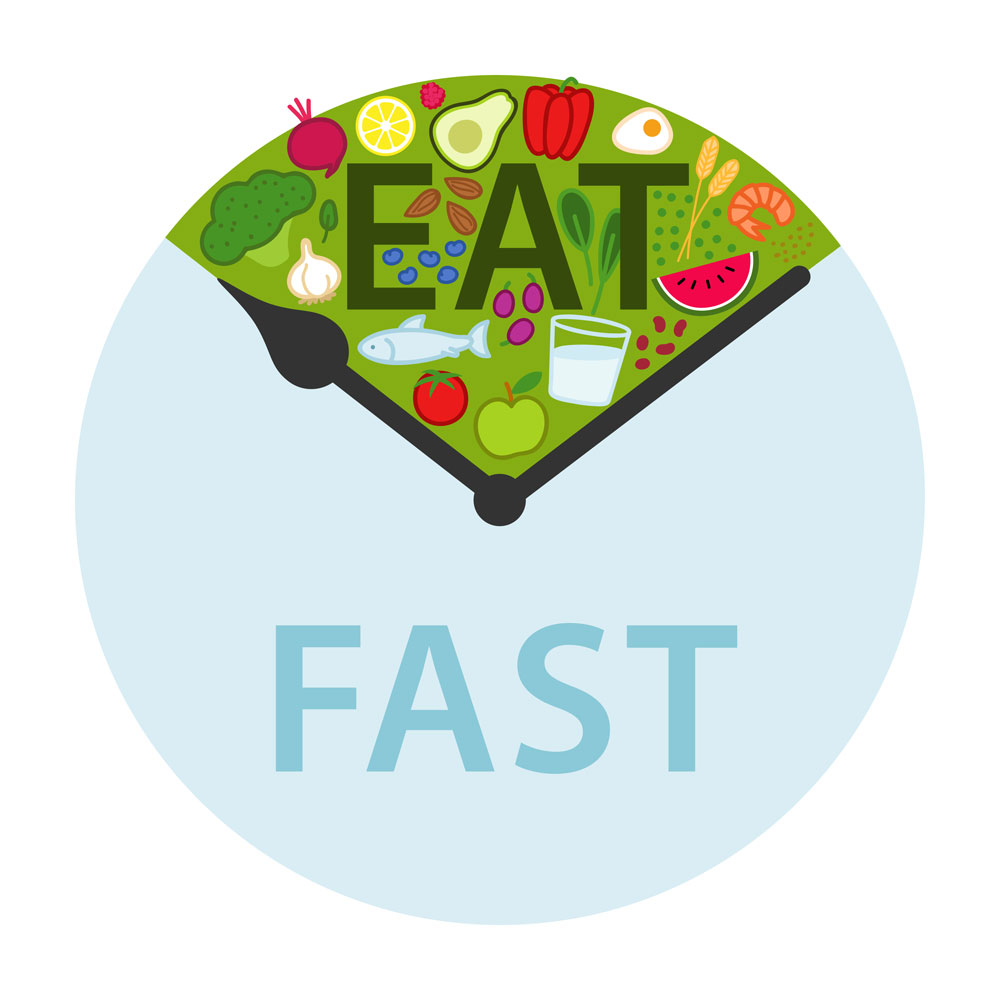Modern day scientists and doctors are in agreement with the benefits that fasts deliver to our body as a whole
The history of fasting
The interesting fact about fasting, is that although all religions prescribe it at particular times of the year, Hinduism predicates the largest in terms of numbers.
The aim of this article is not to compare differences in beliefs and fasts but to draw your attention to how this ancient aspect of life has emerged as one of the key factors that can heal your body and give you renewed life and energy.
The Vedas describe in detail the rationale and the practices for fasting. As we know in Islam, a strict 40 day fast advocates no water or food for roughly 12 hours, the Christians fast during the solemn period of lent.
Religious fasting is a moral and spiritual act where the aim is to purify the body and mind thus being more attuned to acquiring divine grace. Fasting, without doubt was a practice designed to cleanse the body and mind.
Some studies have shown that even in times gone by, fasting has improved mental health by making people feel good about themselves with increased self-esteem, self-confidence, willpower and discipline.
These advantages are now being acknowledged by medical professionals all over the world, as one of the significant ways to achieve well- being of a sharp brain and a sprightly body. Modern day scientists and doctors are in agreement with the benefits that fasts deliver to our body as a whole.
In recent times, the scientifically recommended fast is intermittent fasting. This is fundamentally a term to label an eating plan that switches between fasting and eating on a regular schedule.
Methods of intermittent fasting include:
- Alternate-day fasting
- Periodic fasting such as the 5:2 diet (eating 5 days and fasting 2 days of the week)
- One meal a day (OMAD)
- Daily time-restricted eating (eating for 6/8 hours and fasting continuously for the remainder 16/18 hours)
- Switching between fasting and eating times during the week so as to optimise fat burning results
Research shows that intermittent fasting is a way live longer, manage your weight and prevent — or even reverse — some forms of disease.
This fast is NOT a diet.
Many diets focus on what to eat, but intermittent fasting is more about when you eat.
With intermittent fasting, you only eat during a specific time. Research proves fasting for a certain number of hours each day or eating just one meal a couple days a week may have health benefits.
Why fast?
As many spiritual avatars have proved that our bodies have evolved to be able to go without food for many hours, or even several days or longer. In prehistoric times, before humans learned to farm, they were hunters and gatherers who evolved to survive — and thrive — for long periods without eating. They had to: It took a lot of time and energy to hunt game and gather nuts and berries.
Experts note that even 50 years ago, it was easier to maintain a healthy weight. There were no computers, and TV shows turned off early for the few who did own a TV; and people stopped eating because they went to bed fairly early compared to today. Portions were much smaller. More people worked and played outside and, in general, got more exercise.
With internet, TV and other entertainment available 24/7, many adults and children stay awake for longer hours to watch TV, scroll through social media, play games and chat online. That can mean sitting and snacking all day — and most of the night.
Stress levels also lead to emotionally driven binges that can play havoc with our health.
Extra calories and less activity can mean a higher risk of obesity, type 2 diabetes, heart disease and other illnesses. Scientific studies are showing that intermittent fasting may help reverse these trends.
The goal of an Intermittent fast is to exhaust your sugar stores and burn fat.
As explained above, there are several methods of intermittent fasting, but they are all based on choosing regular time periods to eat and fast. For instance, you might try eating only during an eight-hour period each day and fast for the remainder. Or you might choose to eat only one meal a day two days a week. There are many different intermittent fasting schedules.
Metabolic flexibility v/s inflexibility
Experts, scientists and Doctors also believe we need to improve our metabolic flexibility from its current inflexible state. Metabolic flexibility is the ability of your body to respond or adapt to conditional changes in metabolic demand.
You have metabolic flexibility when you possess excellent satiety between meals. On the other hand, if you are always carrying a snack or piece of fruit “just in case you get hungry”, then it is likely your sugar spikes are demanding fuel in your body and this is how the body gets geared up to store more fat. It is metabolic inflexibility.
Can you go five or six hours without needing your next meal or snack? Appetite control is one of the many amazing benefits of metabolic flexibility
Given our modern day scenario most of us mindlessly eat throughout our waking hours. If we are eating three meals a day, plus snacks, and not exercising, then every time we eat, the body is running on those calories and not burning their fat stores.
Intermittent fasting works by prolonging the period when your body has burned through the calories consumed during your last meal and begins burning fat.
Types of fasting
It’s important to check with your doctor before starting intermittent fasting. Once you get his or her go-ahead, the actual practice is simple.
- As mentioned above, you can pick a daily approach, which restricts daily eating to one six- to eight-hour period each day. For instance, you may choose to try 16/8 fasting: eating for eight hours and fasting for 16. Although some people find it easy to stick with this pattern over the long term, one research study that was not designed specifically to look at an intermittent fasting pattern found that limiting your daily time window of eating does not prevent weight gain over time or yield significant weight loss results. That study’s results showed that reducing the number of large meals or eating more small meals may be associated with minimising weight gain or even with weight loss over time.
- Another intermittent fasting plan, known as the 5:2 approach, involves eating regularly five days a week. For the other two days, you limit yourself to one 500–600 calorie meal. An example would be if you chose to eat normally on every day of the week except Mondays and Thursdays, which would be your one-meal days.
- Yet another approach is to go (many scientists and doctors recommend it), longer periods without food, such as 24-, 36-, 48- and 72-hour fasting periods. These are not necessarily better for you or meant for seniors, and may be dangerous. So do be in constant touch with your doctor before and during embarking on long fasts or any fast for that matter. Paradoxically, going too long without eating might actually encourage your body to start storing more fat in response to starvation.
How fast do we see the results of fasting?
Research shows that it can take two to four weeks before the body becomes accustomed to intermittent fasting. You might feel hungry or cranky while you’re getting used to the new routine. But, research subjects who made it through the adjustment period tend to stick with the plan because they notice they feel better and shed more troublesome-to-lose belly fat.
Pathology before and after embarking of fasting periods can also be an indicator of how your internal parameters are responding to you change in eating plans.
Some points to note:
- During the times when you’re not eating, water and zero-calorie beverages such as black coffee and tea, apple cider vinegar and lemon water etc. are permitted.
- During your eating periods, “eating normally” does not mean going crazy. Research shows that you’re not likely to lose weight or get healthier if you pack your meal times with high carb, high-calorie junk food, super-sized fried items and sweet treats.
- But what some experts like about intermittent fasting is that it allows for a range of different foods to be eaten — and enjoyed. Sharing good, nutritious food with others and savoring the mealtime experience adds satisfaction and supports good health.
- Most nutrition experts regard the Mediterranean diet as a good blueprint of what to eat, whether you’re trying intermittent fasting or not. You can hardly go wrong when you pick leafy greens, healthy fats, protein and complex, unrefined carbohydrates such as whole grains.
- Women are genetically different from men – hence hormones in women can go haywire on fasting. It is essential to consult your doctor to map out a plan that works with your internal systems.

The Benefits of Intermittent Fasting
Research shows that the intermittent fasting periods do more than burn fat. When changes occur with this metabolic switch, it affects the body and brain.
The New England Journal of Medicine and in fact many publications, have revealed data about a range of health benefits associated with the practice. These include a longer life, a leaner body and a sharper mind.
Many things happen during intermittent fasting that can protect organs against chronic diseases like type 2 diabetes, heart disease, age-related neurodegenerative disorders, even inflammatory bowel disease and many cancers.
Here are some intermittent fasting benefits research has revealed so far:
- A boost in thinking and memory. Studies discovered that intermittent fasting boosts working memory in animals and verbal memory in adult humans.
- Improved heart health. Intermittent fasting improved blood pressure and resting heart rates as well as other heart-related measurements.
- Physical performance is better. Young men who fasted for 16 hours showed fat loss while maintaining muscle mass.
- Prevent and/or even reverse Type 2 diabetes and obesity. In animal studies, intermittent fasting prevented obesity. And, in six brief studies, obese adult humans lost weight through intermittent fasting.
- People with type 2 diabetes may benefit: Most of the available research shows that intermittent fasting can help people lose body weight and lower their levels of fasting glucose, fasting insulin. Certain studies found that some patients practicing intermittent fasting with supervision by their doctors were able to reverse their need for insulin therapy.
- Overall tissue health. In animals, intermittent fasting reduced tissue damage in surgery and improved results.
Is this type of fasting safe?
Some people try intermitting fasting for weight management, and others use the method to address chronic conditions such as irritable bowel syndrome, high cholesterol or arthritis.
But intermittent fasting isn’t for everyone. Before you try intermittent fasting (or any diet), you should check in with your doctor first. Some people should steer clear of trying intermittent fasting:
- Children and teens under age 18.
- Women who are pregnant or breastfeeding and have hormonal problems.
- People with type 1 diabetes who take insulin. While an increasing number of clinical trials have shown that intermittent fasting is safe in people with type 2 diabetes, there have been no studies in people with type I diabetes. There is a concern that an intermittent fasting eating pattern may result in unsafe levels of hypoglycemia during the fasting period.
- Those with a history of eating disorders.
- Age related illnesses which require constant medication.
The verdict on fasting
If you do not fall into one of the above categories you could do intermittent fasting safely and can continue the regimen indefinitely. It can be a lifestyle change ― and one with benefits.
Keep in mind that intermittent fasting may have different effects on different people. Talk to your doctor if you start experiencing unusual anxiety, headaches, nausea or other symptoms after you start intermittent fasting.
Additionally, if you have been used to a lifetime of fasts because of religious traditions, your body will adapt better and quicker to changes in your eating plan. After all centuries ago, religions possessed more than some wisdom to advocate purifying the body and mind through fasting.




